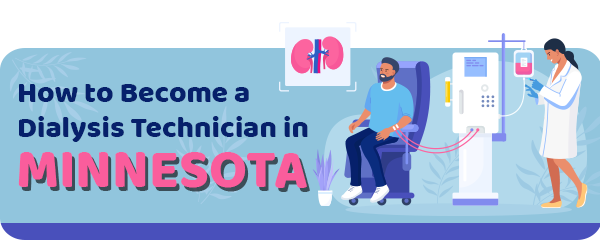
Without dialysis machines and the skilled individuals to operate them, many lives would be at a higher risk.
This underscores the critical role of dialysis technicians within the healthcare field.
Operating a dialysis machine may not be perceived as glamorous, yet it presents a fulfilling career path for those driven by the desire to assist others.
If you seek more insights into this profession, you’re in the right place.
Keep reading to discover all you need to know.
Article Table of Contents
Dialysis Technician Job Description in Minnesota
When choosing a career path, it’s essential to comprehend the responsibilities it entails.
Dialysis technicians in Minnesota primarily work with patients facing kidney-related issues.
Their primary responsibility is to ensure the efficient operation of dialysis machines, tailored to each patient’s specific requirements.
Here are some of the core responsibilities of this profession:
- Monitoring the vital signs of patients
- Assisting patients throughout the dialysis procedure
- Ensuring the safety and comfort of patients
- Reviewing patients’ medical history to identify potential concerns during the procedure
- Adjusting dialysis machines to suit individual patient needs
- Administering oxygen when necessary
- Basic Cardiopulmonary Resuscitation (CPR) if required
These tasks represent some of the typical duties performed by dialysis technicians.
On a day-to-day basis, the specific responsibilities may vary.
Dialysis Technician Requirements in Minnesota
Minnesota does not enforce rigid training and certification requirements for dialysis technicians.
People pursuing this career must adhere to the directives established by the Centers for Medicare and Medicaid Services (CMS).
The CMS stipulates the following prerequisites for aspiring dialysis technicians:
- High school diploma or GED
- Training
- Credentialing
- Competency Standards of Practice
- Licensure or certification
- Gaining experience
Candidates must attain certification within 18 months of commencing their employment.
Several nationally recognized certification examinations are available for dialysis technicians:
- The Nephrology Nursing Certification Commission (NNCC)
- Certified Clinical Hemodialysis Technician (CCHT) Exam
- The Board of Nephrology Examiners Nursing and Technology (BONENT)
- Certified Hemodialysis Technician (CHT) Exam
- The National Nephrology Certification Organization, Inc. (NNCO)
- Certified in Clinical Nephrology Technology (CCNT) Exam
- Certified in Biomedical Nephrology Technology (CBNT) Exam
The certification requires passing both a written and practical examination.
Dialysis Technician Training in Minnesota
Becoming a dialysis technician in Minnesota necessitates the successful completion of a comprehensive training program.
The journey commences with a high school diploma or GED.
High school coursework should place particular emphasis on subjects such as:
- Biology
- Chemistry
- Medical terminology
- Anatomy
- Physiology
However, the core of your training begins at post-secondary educational institutions, which could encompass vocational schools, community colleges, or technical institutes.
Your educational focus will then shift toward vital topics like:
- Principles of dialysis
- Care of patients with kidney failure
- Possible complications of dialysis
- Water treatment and dialysate preparation
- Infection control
- Safety Dialyzer reprocessing
A typical training program takes approximately one year to complete.
Below, you can find a list of institutions offering approved courses in Minnesota.
Auburn University 
Auburn University offers a fully online dialysis technician program at a tuition fee of $3,000.
This program encompasses a wide range of offerings, such as:
- Interactive learning modules,
- Various learning exercises,
- Access to career resources,
- Round-the-clock mentoring support,
- Opportunities for national and state certifications,
- Self-paced learning.
Students are expected to complete their coursework within a maximum duration of 6 months.
Calhoun Community College 
Calhoun Community College provides a comprehensive 50-hour training program with two flexible options for completion.
The 2 options are online and offline, and students from other states are easily accepted for the online class.
This program can be accomplished remotely, and the tuition fee is $1,299, which includes e-books.
It must be completed within a span of 6 months.
Please note that refunds are only applicable for in-person classes.
Alabama State University 
Alabama State University provides an online training program for individuals preparing for the Certified Hemodialysis Technicians (CHT) test.
The Board of Nephrology Examiners Nursing and Technology (BONENT) administers it.
This program is accessible to students from other states, although they should verify its compliance with their state’s regulations.
The total tuition fee for this program amounts to $4,190, which can be paid in installments.
This comprehensive program spans 205 hours and must be completed within a year, even for those studying at their own pace.
CPR training and certification are included and offered by the Red Cross.
Some of the key subjects covered in this program include:
- The Cardiovascular System
- The Urinary System
- The Endocrine System
- The Reproductive System
- Infection Control
- Principles of Hemodialysis
| School Name | Address |
|---|---|
| Auburn University | online |
| Alabama State University | online |
| Calhoun Community College | online |
Dialysis Technician Salary in Minnesota
Before embarking on a career path, it’s vital to understand the potential income.
Dialysis technicians typically begin at an entry-level position with an average annual income of about $45,100 in this state.
For those curious about cities in Minnesota with higher dialysis technician salaries, a comprehensive list is available in the table below.
Annual Salary Range:| Location | Avg. Annual Salary |
|---|---|
| Minnetonka | $46,900 |
| Saint Paul | $46,900 |
| Osseo | $46,800 |
| Wayzata | $46,800 |
| Willernie | $46,700 |
| Lakeville | $46,600 |
| Afton | $46,500 |
| Stacy | $46,500 |
| Vermillion | $46,400 |
| Waterville | $45,100 |
Regional Salary in Minnesota
| Region | Employed | Avg. Annual Salary | Avg. Hourly Pay | Top 10% Annual Salary | Bottom 10% Annual Salary |
|---|---|---|---|---|---|
| Duluth, MN-WI | 300 | $58,200 | $27.98 | $78,900 | $40,240 |
| Mankato-North Mankato, MN | 90 | $59,840 | $28.77 | $75,390 | $43,310 |
| Minneapolis-St. Paul-Bloomington, MN-WI | 3,620 | $65,280 | $31.39 | $83,710 | $43,220 |
| Rochester, MN | 1,110 | $62,830 | $30.21 | $82,870 | $39,980 |
| St. Cloud, MN | 120 | $56,990 | $27.4 | $73,730 | $43,130 |
* Employment conditions in your area may vary.
Frequently Asked Questions
Where Does a Dialysis Technician in Minnesota Find Work?
There are many different settings where a dialysis technician can find employment.
The following locations are the most common:
- Hospitals
- Dialysis centers
- Outpatient clinics
- Home healthcare agencies
Do I need a license or a certification to work as a dialysis technician in Minnesota?
In Minnesota, individuals only need a certification recognized at the national level if they want to work as dialysis technicians.
Which Other Skills Are Required for a Dialysis Technician in Minnesota?
Dialysis techs must possess a series of skills and abilities.
These include:
- Attention to details
- Excellent communication
- Empathy
- Patience
- Compassion
- Technical mind
Read the full guide: How to Become a Dialysis Technician